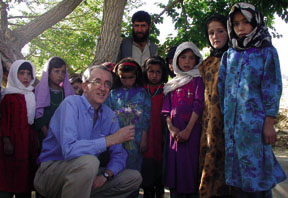|
Web
Exclusives:Features
Alumni Spotlight: In too many places in the world, says Peter Bell *64, too many people live in extreme poverty, supporting themselves on less than $1 per day. In these places, wholesome food and clean water are almost unheard-of luxuries rather than the "amenities we regard as necessities," he explains. Since the terrorist attacks of September 11, 2001, even a realistic idealist like Bell, who holds a master's degree in public affairs from the Woodrow Wilson School, has found that his "vision for a better world" is a bit more distant. As president of CARE, the private international relief organization that provides emergency aid and promotes sustainable development in more than 60 countries, Bell's view carries particular weight. Bell travels to about half a dozen developing countries each year to get to know the communities CARE serves and to meet with government officials to advocate on behalf of the poor. In his seven years with the organization, he has witnessed the devastating effects of extreme poverty in 30 countries, including Rwanda, Afghanistan, Peru, and East Timor, and has seen how the most basic improvements — such as a spigot connected to a clean water supply — change people's lives. CARE has been involved in Afghanistan for over 30 years. In Kabul, the organization runs a water-and-sanitation program that supplies clean water to more than a quarter of a million people; CARE also provides health education and distributes food to war widows. In other parts of the country, CARE workers help rebuild houses, run food-for-work programs, implement a community-organized primary education project that reaches upwards of 20,000 children, and assist farmers in coping with drought and enhancing their agricultural productivity. Perhaps anticipating what the 21st-century world needs to survive,
CARE has "transformed itself from a charity into a cause,"
Bell says. The organization has done that by expanding its scope
and by advancing the view in the developed world that to fail to
remedy conditions in the poorest countries is an injustice of the
greatest proportions. "We want to be known everywhere not only
for our strengthening of poor communities but also for our unshakable
commitment to the dignity of each person."
By Marianne Eismann '79 Marianne Eismann teaches high-school English in New York City.
|

 April
10, 2002:
April
10, 2002: "No
direct relationship" exists between poverty and terrorism,
says Bell, noting that the September 11 hijackers all came from
economically stable backgrounds. "The vast majority of poor
people are intent simply on eking out a living," he explains.
"But the discrimination, exclusion, and sense of injustice
that accompany poverty can make some people susceptible to demagoguery
and extremism. In that sense, poverty is, as Salman Rushdie says,
the ëgreat helper' of fanatics." The world of "hope,
tolerance, and social justice" that CARE seeks to build "would
be the best antidote to terrorism."
"No
direct relationship" exists between poverty and terrorism,
says Bell, noting that the September 11 hijackers all came from
economically stable backgrounds. "The vast majority of poor
people are intent simply on eking out a living," he explains.
"But the discrimination, exclusion, and sense of injustice
that accompany poverty can make some people susceptible to demagoguery
and extremism. In that sense, poverty is, as Salman Rushdie says,
the ëgreat helper' of fanatics." The world of "hope,
tolerance, and social justice" that CARE seeks to build "would
be the best antidote to terrorism."